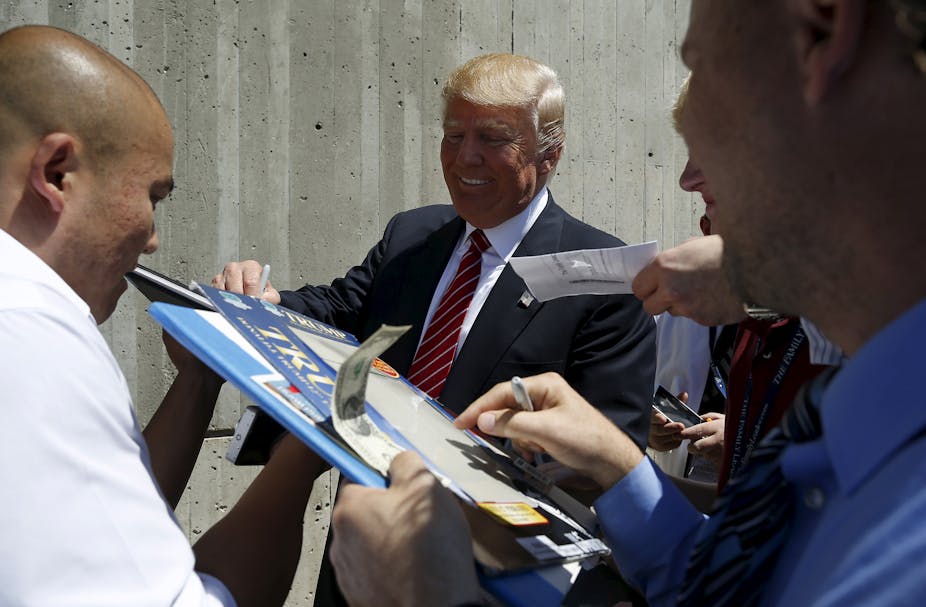As the presidential primary heats up, the political media remain transfixed with the latest exploits of billionaire/reality television star Donald Trump. The focus on Trump comes at the expense of a Republican Party already struggling with declining favorability ratings.
While many of his Republican opponents have issued harsh condemnations of his comments, especially those denigrating the military service of Senator John McCain, other national GOP leaders have held their tongues.

House Majority Leader Kevin McCarthy recently told reporters he can understand why voters would support an outsider like Trump while also praising his marketing skills.
It may seem odd that Republicans have been relatively muted on Trump’s campaign considering all of the negative publicity generated. However, there are several reasons national Republican leaders not running for president have avoided denouncing him. Why are they holding their fire?
They know Trump will flame out
One reason is that they have seen this scenario unfold before, in the 2012 primary process.
Fringe candidates like businessman Herman Cain jumped to the front of the pack in national opinion polls and faded quickly once he received harsh scrutiny from the press and the other candidates. Even in the 2008 presidential cycle, a more credible candidate like former New York Mayor Rudy Giuliani enjoyed stronger poll numbers in the year leading up to the primaries but eventually saw his support evaporate once the voting began. Republican Party leaders can safely assume a similar fate awaits Trump.
Republican leaders can take comfort in the fact that Trump is not worth getting exercised over because it is still early in the process. For many Republican primary voters, it might be fun to tell a pollster they are voting for Trump based on celebrity or their dissatisfaction with the Republican establishment in Washington.
It is another thing entirely to actually cast a ballot for somebody with serious flaws once the primaries and caucuses begin next year. Political science research demonstrates that voters will factor electability into their presidential primary decisions. Once voters begin to seriously consider whom they actually want to be the Republican nominee, support for Trump will likely crater.
Even if Trump manages to maintain his standing for longer than most analysts expect, he won’t be able to translate that support effectively. He lacks the electoral infrastructure and the organizational know how to mobilize voters in the primary process. Odds-on GOP front runners like Jeb Bush, Marco Rubio and Scott Walker have the kind of political networks that will sustain them for a long primary battle. As an outsider with no electoral experience, Trump won’t be able to amass the kind of organization necessary to remain a viable contender during the primaries and caucuses.
They don’t want him to run as an Independent
Apart from their confidence that his campaign will eventually implode, Republican leaders are being polite because they don’t want him to bolt the party and launch an independent bid for the presidency that would greatly enhance the prospect of Hillary Clinton winning the general election.
Early polling data suggest that under such a scenario, he would siphon off critical support the Republican nominee would need to prevail against Clinton. While Trump remains committed to winning the GOP nomination, he recently stated that his treatment by Republicans would influence his decision whether to mount an independent candidacy. If Trump did decide to move in that direction, he could certainly inflict grievous harm on the Republican Party’s hopes of winning the White House.
While third-party presidential candidacies have not gained much traction in recent elections, Ralph Nader’s 2000 campaign showed that in a close race, they can play an effective spoiler role. That year, political commentator Pat Buchanan left the Republican Party and ran as the Reform Party candidate. Buchanan didn’t generate much support, with his limited financial resources and lack of media attention to his campaign.
But Donald Trump will have the financial means to compete and is adept at garnering media attention, as recent developments have illustrated. Even if most conservative-leaning voters rally around the eventual Republican nominee, a certain number of the party’s political base will be tempted to cast a protest vote for him. That would most certainly end up handing the election to Hillary Clinton.
Republican leaders want no part of this outcome, so they will allow Trump to have his moment in the sun. They recognize Trump is a wild card they cannot control and do not want to provoke. Patiently waiting out this spectacle is the most prudent course of action even if Trump does continue to embarrass himself and the party in the process.

